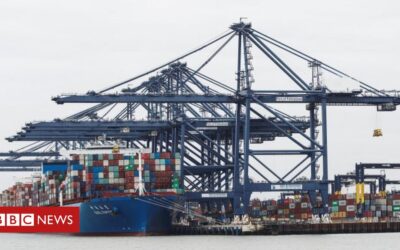Four ferry firms have landed government contracts worth a total of £77.6m to provide post-Brexit freight capacity.Brittany Ferries, DFDS, P&O Ferries and Stena Line will have the job of ensuring medical supplies and other vital goods continue to get to the UK.The government says it wants a smooth flow of freight “whatever the outcome of negotiations with the EU”,The contracts will be in place for up to six months after the Brexit transition period ends on 31 December. Freight operators have warned about potential delays to cross-Channel trade at major ports such as Dover and Folkestone from 1 January.Court settlementThe government says it “continues to work with key local stakeholders and industry to prepare for the end of the transition period”.The additional capacity will be on quieter ferry routes between mainland Europe and UK ports in Felixstowe, Harwich, Hull, Newhaven, Poole, Portsmouth, Teesport and Tilbury.In 2018, the government awarded contracts worth a total of £87m to ferry companies for similar contracts, which were not needed in the end because Brexit was postponed. The then Transport Secretary Chris Grayling faced calls to quit after it emerged one of the contracts, worth £13.8m, had gone to Seaborne Freight, a company which had never run a ferry service and had no trading history. Seaborne Freight recently went bust.No money was paid to Seaborne Freight – but the Department for Transport paid Eurotunnel £33m in an out-of-court settlement after the firm claimed it had been unfairly overlooked for the work and that the contracts had been awarded in a “secretive” way.The government said the latest ferry contracts have been awarded from a shortlist of “experienced freight operators” entering bids.’Unprecedented disruption’Chris Grayling’s successor, Grant Shapps, said: “As the transition period comes to an end, we are putting the necessary measures in place to safeguard the smooth and successful flow of freight.”Securing these contracts ensures that irrespective of the outcome of the negotiations, life-saving medical supplies and other critical goods can continue to enter the UK from the moment we leave the EU.” But Best for Britain, which campaigned against Brexit, questioned the wisdom of relying on ferry operators to secure essential medical supplies.The campaign group’s chief executive Naomi Smith said: “Supply chains are already experiencing unprecedented levels of disruption due to Covid and a no-deal Brexit could create huge new logistical problems for medicine suppliers and those relying on them, particularly given how late these arrangements have been made.”With time and money now in very short supply, the government would do well to channel its energy into securing an agreement with the EU to prevent the possibility of shortages in the new year.”
BBC Business News Articles
IMF upgrades 2020 economic forecast but warns of a slower 2021
Africa ‘needs $1.2tn’ to recover coronavirus losses
Shenzhen residents embrace digital currency
‘One day everyone will use China’s digital currency’
Unemployment rate hits highest level in three years
Meanwhile redundancies rose to their highest level since 2009, the Office for National Statistics (ONS) said.
Tax rises of more than £40bn a year 'all but inevitable'
UK economic growth slows despite restaurant boost
'I didn’t want to tell anyone I was claiming benefits'
By Esyllt CarrBusiness reporter, BBC News The coronavirus pandemic has seen record numbers of people claiming Universal Credit – but a poverty charity says its research shows the stigma around being on benefits has increased.Alex, who doesn’t want to use his real name, says it had never occurred to him to claim benefits – until coronavirus gave him little choice. A self-employed contractor in the construction industry, and part owner of a nightclub, he found he fell through the cracks of any government schemes to support workers. “I’ve been a high earner and I think of myself as someone who gives back to the system, rather than takes from it”, he says. But with a family to support and bills mounting up, he finally turned to what he describes as the last resort. “I swallowed my pride,” he says.Stigma increasing In the first three months after lockdown, there were 3.2 million new applications for Universal Credit. But while the virus’ economic consequences have been far reaching and unprecedented, research from the poverty charity Turn2Us has found that the stigma around claiming benefits has become more pronounced.One in four people surveyed by the charity in April said they believed claimants should be ashamed, up from one in ten of those asked in 2012. The survey also revealed that 44% of people don’t think that those who claim benefits are treated with dignity and respect. The charity’s Anna Stevenson – a welfare benefits specialist – says these feelings can deter people from claiming Universal Credit. “It leads to people struggling unnecessarily when the support is there,” she says. “If we knew people were failing to get the medical help they needed because they were afraid of being judged by the doctor, we’d rightly see that as a national crisis – and yet, somehow when it comes to the welfare system it’s just accepted as normal. And that’s completely wrong.”A DWP spokesperson said Universal Credit had “supported millions of people through the pandemic, with it processing “10 times the volume of claims we’d normally expect during our busiest weeks and getting money into the accounts of those in urgent need within days.””This study seems out of step with that reality.”The vast majority of people are satisfied with the service we provide and we’re particularly proud that they feel fairly treated by us. In the latest Claimant Experience Survey, 81% of people were satisfied with DWP services,” it added.’I didn’t want to tell anyone’However Alex says the stigma held him back from applying for support – running up credit card debt in the meantime. What he says made a difference, was the fact that during lockdown, the process was temporarily handled entirely online and over the phone. “It certainly wasn’t as bad as I’d imagined, based on what I’d read and seen on TV. I wish I’d done it sooner,” he says. However, he admits the stigma remains. Now he’s working again, he’s still only told one person that he claimed Universal Credit. “I’ve held senior, well-paid jobs, I drive a nice car and go on nice holidays. I was embarrassed.”‘I’ve worked for 30 years and never claimed a penny’image copyrightJamie WattJamie Watt from Suffolk also found himself applying for benefits for the first time after being made redundant from his job as a quantity surveyor at the start of lockdown. “Initially I was very reluctant”, he says. “I’ve worked for 30 years and never claimed a penny. Not even when I was made redundant in 2008, but this time there was no prospect of work any time soon – I had no choice.”Jamie was told he was only eligible for job seekers allowance, and received that for five months until he found another job. He feels the pandemic has lessened the stigma around benefits – with lots of people finding that they’re relying on state support in some form. “The furlough scheme has helped so many people. When all is said and done, that’s a government handout too and people are happy to accept it.”Turn2Us says its latest findings show reform is needed to tackle the current levels of stigma. Amongst other things, they’re calling for those who use the system to have a say in how it’s designed. “The question is what the long term impact will be on this large number of new benefits claimants,” says Anna Stevenson. “We know that the experience of being out of work can cause increased anxiety and depression – and the additional weight of the stigma only adds to that.”
Singapore Airlines sells out meals on parked plane
Extra facility opened for planes grounded by Covid-19
Leicester textile firms 'involved in money laundering'
It has now terminated its relationship with one of the firms highlighted by the investigation by BBC Radio 4’s File on 4.
Ada Lovelace Day: '2020 has been a hard slog'
By Zoe KleinmanTechnology reporter From caravans to kitchen tables, and podcast production to pregnancy, I’ve been speaking to many women in and around the technology sector about how they have adapted to the challenges of working during the coronavirus pandemic. Research suggests women across the world have shouldered more family and household responsibilities than men as the coronavirus pandemic continues, alongside their working lives.And they share their inspirations, frustrations but also their optimism.”I have a new business and a new life,” says Clare Muscutt, who lost work, her relationship and her flatmate as lockdown hit. This Tuesday is Ada Lovelace Day – an annual celebration of women working in the male-dominated science, technology, engineering and maths (Stem) sectors.And, this year, it has a very different vibe.Varsha Amin, technology and digital skills coach, Hampshireimage copyright@Shadz_ig Initially it felt like business was paused. Confidence went. I’ve now gone fully online. The tech is there to support it. And weirdly, I think I’ve benefited from it. I’m booking up months ahead. The digital skills gap is costing the economy billions. People, and even entire corporations, are so far behind. Then, you add in the complication of Covid. And you think everything is going to go backwards. But actually, digital is growing exponentially. I’m dyslexic, so I have relied on tech to help get me where I am today.I’m a firm believer that tech can really enable anyone from anywhere to start their own business and make it fly.My husband is a neuroscientist. When Covid first hit, he was redeployed to the front line. And we had no childcare. There were days when I sat in front of my laptop and cried. Getting the right balance is difficult.In September, my daughter started school. In the future, when she becomes more independent, I will go all out on my business.Jess Ratty – entrepreneur, technology public-relations company founder, Cornwallimage copyrightJess RattyThere is absolutely no doubt that this has been the hardest year of my life. I lost 40% of my business in two days, at the start of lockdown. I had worked so hard to get to where I had got to. And I was filled with fury that a pandemic had taken it away.Every pitch we get, I throw as much energy at the screen as possible. I find myself working longer hours to be more visible to my clients. I am driven by this fear that next week I could lose another couple. But I have now got 60% more business back in.I’m used to working from home. But the biggest problem was having my eight-year-old daughter suddenly with me 24/7, when the schools closed. We all knew it might come. But when it did, it happened so fast.It was really difficult having to work and do childcare at the same time. Before lockdown, I would have said it was impossible.I’m embarrassed to say that she spent a lot of time watching Netflix and Disney+.But I am the breadwinner. And my partner was working full time on our house renovation because, until it was finished, we were living in a static caravan.I’m now launching a new business, this time in edtech [education technology].I’m looking to do as many things as possible to protect those closest to me and prepare for the next “impossible thing” to happen. Clare Muscutt, digital customer experience entrepreneur, Esseximage [email protected] I used to do doesn’t exist anymore. I had the life and career of my dreams. And I had left the corporate world to do it. As soon as the pandemic hit, my diary just emptied. The clients I had work booked with shut down any unnecessary spend. Then, my relationship ended. My best friend moved out of our flat. And suddenly, the only contact I had with others was through Zoom. I started having conversations with women in a similar field to me. And we started sharing how we were feeling.It made me think: “How can I bring this style of conversation to the world, to help inspire others?”And that led me into podcasting. After a bad experience, I taught myself how to do the production. And it has led to me being paid to interview tech leaders elsewhere. My bills are now getting paid. And the podcast is helping me to form an online community.Before the pandemic, I was living for the future – always looking forward to the next big event or trip away.Now, I don’t know what the future holds or whether things will ever go back to the way they were. But if they don’t, it’s OK – I have a new business and a new life.Rebecca, cyber-security specialist, IrelandI have worked from home before. And at the start of lockdown, I didn’t think it would be that much of a big deal. But it turned out that working from the kitchen table was very uncomfortable.Eventually, I finally got an old desk from a friend. And I was so happy. Since lockdown began, I’ve seen quite a few cyber-security issues with phishing and invoice re-direction – when a malicious actor gets hold of a legitimate invoice and resends it but changes the bank details. Sometimes, it’s small amounts here and there, sometimes large amounts. It’s often difficult to recover the money.I’m also four months pregnant with our first child.I need new clothes. But if you go to the shop you can’t try anything on. And I have no idea what size I am.Plus, I am limited in the times I can go out. I don’t drive. It has to fit around work. And we can’t go at busy times, because standing in long queues is so exhausting. I feel like I’ve lost my independence. In addition, they haven’t yet figured out how they are going to hold antenatal classes. I feel like I won’t meet any other parents until my kid starts school.Claire Broadley, technical writer, Leedsimage copyrightMathew DixonBefore lockdown, my husband and I ran our own company, producing user guides and written content for websites.Business income dropped by about two-thirds during lockdown. We weren’t eligible for any government grants. And because we still had a small amount of work, we couldn’t furlough ourselves. It felt like we were slowly marching our family towards a cliff edge. In May, to my astonishment and relief, I was offered my dream job, remote writing about the internet and technology.Working from home with the children has been the most difficult thing we’ve ever done. My son is seven. He is very scared. Sometimes, we can’t spend the time with him that we would like to. And most screen-time rules have gone completely out of the window. The real issue for us now is testing. My young daughter caught Covid in July. And she recently had a temperature again. But it took six days to get a test result, so my son was off school again. And my husband was working until midnight to fit everything in.Suw Charman-Anderson, founder, Ada Lovelace Day, US image copyrightPaul ClarkeFor Ada Lovelace Day, we usually hold a cabaret-style event in central London.Instead, we are holding five free webinars and have organised a 50-hour online extravaganza, with blog and social media posts and a YouTube playlist. In November, we’re running our first online conference, which will span 29 time zones. I’ve had to find and evaluate livestreaming services and conference platforms, something that I’ve never had to consider before. It’s been quite stressful working out how to run our online events affordably and dealing with the additional work involved. Our income has been badly affected by the pandemic as companies have less money to spend on event sponsorship, so we’re also having to think about how we’re going to make up that shortfall. Despite that, I’m really excited by what we’re doing. Covid forced us to rethink everything. And some of the changes we’ve made may become permanent. 2020 has been a hard slog. And we’re not out of the woods yet. But I hope we’ll emerge stronger and able to reach and support more women in Stem. Related TopicsWomen in businessWomenWomen in technologyMore on this story
Apple iPhone 12: The chip advance set to make smartphones smarter
Travel back just four years, and many industry insiders doubted the advance could be delivered so soon.










